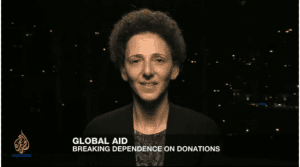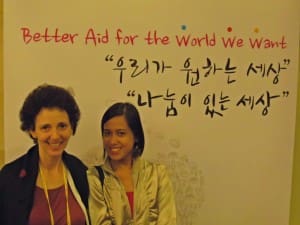Click on the image to watch the February 16, 2013 edition of Aljazeera’s “Counting the Cost.” The show is 25 minutes and focuses on aid to Palestine and Kenya. Let me know what you think!
I recorded this short video with Saeeda Mousa, Executive Director of Dalia Association. In it, she talks about the amazing potential return on investment in the Palestinian community, but it’s not the type of investment that you might be thinking of!
[youtube http://www.youtube.com/watch?v=J4Kx8yUhQ7c?rel=0&w=420&h=315]
Five Guaranteed Ways to Profit from Investment in the Palestinian Community
This article appeared in This Week in Palestine’s January 2013 issue on the theme of investment.
Investors want their assets to multiply. They buy shares in companies or funds and expect financial returns in the form of periodic dividends or growth in the value of their shares. Our economy revolves around investment – investors accept stakes in other people’s ventures; entrepreneurs grow their initiatives with others’ resources and support.
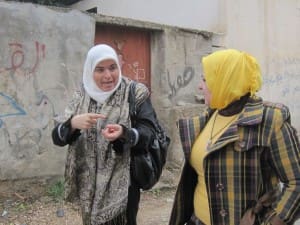
“Community investment” is a little different. It also involves inputs, but the inputs are not limited to money. They include expertise, material goods, moral support, and more. Community investment is profitable, but it brings a social return on investment (SROI) instead of simply financial gain.
The social return on community investment in Palestine can be measured in stronger community institutions, lower poverty, better education, improved livelihoods, personal security, hope for the future, and other collective benefits. Moreover, making a profitable community investment in Palestine is less risky than almost any other kind of investment if you keep these five guidelines in mind:
1. Focus on the potential return. If you invest in a community group that becomes empowered and effective, how will it impact children’s life chances, equality for women, sustainable farming, cultural expression? Isn’t it an honour to play a small role in the development of Palestine?
2. Show faith in the management. If managers are credible and if they are learners, support their leadership, even when they take risks. Community leaders are not contractors to be hired to implement activities. They are the dedicated front line of social change. Believe in them, even when they doubt themselves.
3. Consider your capacity. Are the resources you have to invest the ones that are needed? Do you have contacts you can use to mobilise other resources? Never think that what you have to offer isn’t enough. If you listen to local priorities, you will find a valuable way to contribute.
4. Make a long-term commitment. One-time transactions may feel good to the giver, but profits from community investment don’t accrue short term, and they rarely lead to sustainability. Are you ready to participate in Palestinian community development for the long haul?
5. Work collectively. No one investor can solve community problems alone. Are you willing to combine your investment with others’ investments in order to capitalise the Palestinian community? One way to do this is through a philanthropic organisation such as Dalia Association, Palestine’s only community foundation.
Saeeda Mousa, director of Dalia Association, took me to Zawiya, a village of about 5,500 residents on 23,000 dunams in Salfit Governorate to see one of Dalia’s community investments. As the road from Ramallah twisted and turned for nearly an hour, I left pieces of my stomach in each Israeli settlement and in each Palestinian village we passed. But it was worth it when I sat with community members and we started talking.
Dalia had already worked intimately with the village, implementing a small-grants programme that empowers community members to decide which of their own community groups to fund and to hold those community groups accountable. It made sense, then, for Zawiya to be a pilot site for Dalia’s “village funds” concept – a kind of resource bank into which local residents, the private sector, and the diaspora could invest in community-led development.
The first contribution of $2,500 came from The Abraaj Group, headquartered in Dubai, which maintains a “company fund” with Dalia Association. That first contribution was a vote of confidence, but it still took more than a year to inspire enough trust to raise more. The next $400 came from Adam, a local Zawiya resident who wanted to be part of launching the new idea. Then Ismail, a Zawiya native living in Brazil, added $1,000 to leverage more funds, and that was followed by a $1,000 contribution from Abdul Qader Mustafa Abu Naba’a, a philanthropist originally from Zawiya who now lives in Jordan. When Adam submitted the idea to Dalia’s philanthropy contest and was one of three winners, it brought another $1,000 to the Zawiya Village Fund. This example demonstrates that “community investment” means both investment in the community and investment by the community. It’s a model that values the financial contribution of investors and the sweat equity of local community workers. They become true partners in the success of their joint venture.
Zawiya residents considered several ideas before deciding to use the $5,900 in the Zawiya Village Fund to provide revolving loans. Seven men and five women took small loans of NIS 1,300 (less than $450) interest free. The municipality contributes by providing the repayment system: they take NIS 100 every month when loan-takers pay their electricity bills. Those payments are set aside for another round of loans. Dalia Association has already committed to adding another $2,500, also from The Abraaj Group company fund at Dalia Association, for the next round of revolving loans.
Abu Majdi was among those very satisfied with his loan. “I had a small store that brought in about NIS 400/month. I expanded it and now it brings in NIS 1,000/month. Now that there’s more work, my mother runs the store. She benefits personally and socially by having something important to do.” Abdel Mi’em used NIS 400 of his loan to buy seeds and dirt, and he planted them in plastic bags that he cut from sheets. “Come back in May and you’ll find 400 small trees; each one selling for NIS 10,” he said proudly.
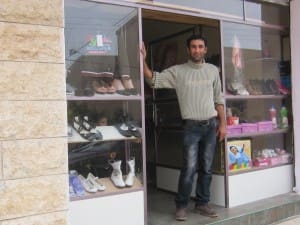
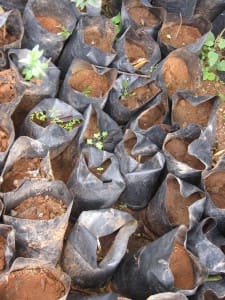
Zawiya was a philanthropic community before Dalia’s involvement. Abu Naba’a invested $135,000 in a cultural centre that was the first in Salfit. It works closely with the municipality offering sports and cultural activities, Islamic education, and other training courses. Many community members are also involved in the village’s nine active groups. Hiyam, who has served on the city council for seven years, says, “When I give, I feel happy. I sacrifice, but I feel I have made a difference.” They stay in contact with villagers who have moved away through an active Facebook page.
“All villages have resources of some kind. Many local residents are ready to give, but they can’t give a lot and they think that their small contribution won’t matter. Business folk like to give to their villages, but only if they have confidence that their contributions will be used well. And there are Palestinians in the diaspora who love to give to their villages, but they want a safe, easy, transparent way to give,” Saeeda says. Village funds housed at Dalia Association provide these benefits. She adds, “Companies can also open corporate social responsibility funds in the name of the company. Groups or individuals can establish funds in the name of a family or on behalf of a specific issue.”
“But community investment is not only about money,” Saeeda says. “Sometimes you just need to believe in people and help them to believe in themselves. Don’t push them onto your timeline or in the direction you think is best for them. Follow their lead and they will find solutions to their own problems.”
We drove back to Ramallah from Zawiya on a different road. We passed Qarawa Beni Zaid, Nabi Saleh, and so many other Palestinian villages ripe for the idea of a village fund. We passed stunning valleys and terrace after terrace of tenderly pruned olive trees. The clouds, puffy against the baby blue sky, were so low you could scoop them up in your hands. Palestine is truly abundant. There are many resources to be mobilised through investment; there is much potential for high social return.
This short film (3:45) satirizes fundraising for Africa. It’s entertaining, provocative and timely. I Loved it! Please share your comments, and join the growing movement to revolutionize aid from a neo-colonial tool to a mechanism for justice and real development.
The video is made by The Norwegian Students’ and Academics’ International Assistance Fund (www.saih.no). With the cooperation of Operation Day’s Work (www.od.no). With funding from The Norwegian Agency for Development Cooperation (Norad) and The Norwegian Children and Youth Council (LNU). Music by Wathiq Hoosain. Lyrics by Bretton Woods (www.developingcountry.org). Video by Ikind Productions (www.ikindmedia.com)
Do I sound impatient?
I wrote this article, “Do I sound impatient? Busan +1 from Palestine” for one of the best development sites around, How Matters. It is part of an Oxfam-sponsored feature on DevEx called, “One year later, where do we stand on commitments made in Busan?“
* * * * *
What exhilaration I felt as a delegate to the Fourth High Level Forum on Aid Effectiveness (HLF4)! I represented a Palestinian NGO with a long commitment to activism for aid reform. For years we did research, made films, circulated petitions, and finally, we were at the table with the decision-makers. I felt bolstered by a decade of global commitments to aid reform and inspired by the brilliance of the advocates coming from conflict and fragile situations. I hoped that the New Deal for Engagement in Fragile States would pave the way for a new type of aid that respects legitimate politics, people’s security, access to justice, improved livelihoods, and accountable and fair service delivery. After all, all the major donors to Palestine, including the United States and European Union, immediately endorsed the New Deal.
But now, one year later, I sit in Jerusalem contemplating the white tails of rockets, trying to understand the logic: yet another unconscionable Israeli attack on Gaza using bombs paid for by the U.S. Yet when the bombs stop and the burials are complete, the U.S. (and others) will pay for the reconstruction. Is that a good use of aid?
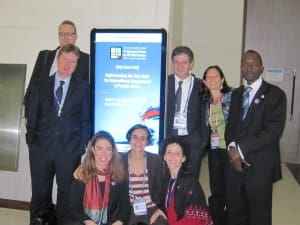
What is the purpose of “aid” if the major donors to Palestine fail to ensure protection for those they claim to seek to help? What is the purpose of “aid” if the major donors to Palestine continue to support Israel politically and economically despite its continued lack of compliance with international humanitarian law?
Do I sound impatient? I am. We don’t have time for consultations on policy coherence. We need donor governments to implement their own policies, fulfill their commitments, and act with integrity. Now. Integrity doesn’t need a logframe.
Do I sound angry? I am. I feel duped. I was part of the aid reform movement before realizing that both aid and aid reform are industries that profit some at the expense of others. Both aid and aid reform distract us from real social change, allowing the powers-that-be to get on with their business of saying one thing and doing another.
In October, I wrote an article in the Guardian outlining my disappointment with aid and aid reform entitled, “Should Palestinians Boycott International Aid?” It does not advocate a blanket rejection of aid, but calls for Palestinians to proactively articulate criteria for acceptable aid and when and why it should be rejected. If Palestinians and other aid-dependent peoples become the gatekeepers for aid funds allocated on their behalf, it will achieve a subtle but profound shift in the balance of power. And this will influence global aid policy much faster and more sustainably than high level forums.
Am I disappointed by the outcome of Fourth High Level Forum on Aid Effectiveness? Hell yeah. Aren’t you?
Perhaps the most important work I’ve ever done…
Over years of work in Palestine, I’ve spoken with hundreds of people about their experiences with international aid. I’ve written articles and delivered presentations and worked on committees, but I don’t see any real changes happening. Most recently, meetings and discussions with Palestinians led to this draft document — criteria for distinguishing aid that should be accepted from aid that should be rejected. It’s perhaps the most important work I’ve ever done. Why? Because it shifts our entire focus away from what we want “them” (donors) to do, which is not in our control, to a focus on what “we” (the Palestinian community) agree to participate in, which is something in our control. It is a draft document intended as a discussion starter. Please, read it carefully and share your thoughts.
INTERNATIONAL ASSISTANCE THAT ADVANCES PALESTINIAN SELF-DETERMINATION IS ACCEPTED
International assistance that advances Palestinian self-determination:
• consistently and explicitly opposes occupation and colonization and puts into practice policies that challenge structural inequality;
• complies with international law and prosecutes those who break it;
• actively challenges Israeli impunity through sanctions and political pressure;
• is actively committed to real democracy, including the right of all Palestinians to choose their own leaders, participate in political life, and receive benefits – regardless of political opinion or affiliation;
• recognizes the unity of the Palestinian community as a whole and aligns policies toward Palestinians in the West Bank (including Jerusalem and Area C), Gaza, Israel, refugee camps, and the Diaspora toward the goal of self-determination;
• respects Palestinians’ right to resist oppression including through means such as Boycott, Divestment and Sanctions;
• leverages coherent political, economic and cultural policies to protect Palestinians, Palestinian rights and Palestinian resources;
• conceptualizes “development” as a way of realizing rights, and respects the right and responsibility of Palestinians to lead the process;
• implements Palestinians’ rights to allocate their own development resources including resources spent on their behalf; and
• provides information about its activities, including budgets, and engages in mechanisms whereby it can be held accountable by local people.
Moreover, international assistance that advances Palestinian self-determination seeks to:
• eliminate the diversion of Palestinian aid funds to international NGOs or international private sector vendors;
• intervene only when local actors cannot, and avoid duplication of or competition with local actors;
• stop the payment of any aid funds to Israeli governmental organizations or to Israeli private sector organizations when there is a Palestinian or international alternative;
• prevent waste of resources on experts that do not add to local knowledge, are overpaid, and are not selected by locals; and
• refrain from unethical practices including corruption, breaking commitments, paying beneficiaries for training, favoritism, double standards, stealing projects, etc.
INTERNATIONAL ASSISTANCE THAT UNDERMINES PALESTINIAN SELF-DETERMINATION IS REJECTED
International assistance that undermines Palestinian self-determination:
• enables Israel to avoid paying costs for which it is responsible as occupier according to international law;
• is not accompanied by active political support for Palestinian self-determination;
• is palliative, “humanitarian,” short-term, or in the form of loans
• demands that Palestinians police one another;
• requires activities that benefit Israel or that decrease pressure on Israel to change its policies;
• supports economic or cultural “solutions” that do not include political rights;
• is based on priorities or strategies developed by non-Palestinians;
• relies on foreign-chosen or installed Palestinians to speak on behalf of the community as a whole;
• wastes funds on “capacity building” that isn’t requested and tied to self-determination;
• requires Palestinians to use foreign languages, frameworks and waste money; and
• disrespects local traditions and beliefs.
Should Palestinians Boycott International Aid?
I’m proud to announce that two important articles of mine were published today:
“Should Palestinians Boycott International Aid?” is available on The Guardian. It’s a short piece that argues that international aid actors are not going to reform their policies; Palestinians need to refuse aid that is detrimental. It quickly generated over 100 comments, so they’ve already closed to new comments. Leave your comments here instead.
Also,
“Aid on Palestinian Terms: The Case for a Boycott” is available on the Palestine Studies Group. It’s a longer article that describes how I went from being an advocate of aid to a critic of aid to an activist for aid reform and now to a critic of aid reform.
These articles grew out of conversations with Palestinians in which we drafted criteria that could be used to distinguish between aid that should be accepted from aid that should be rejected.
The Guardian article was reprinted in Al-Quds Online in Arabic and in the print edition on October 19, 2012. There will be an Arabic version of the longer article published soon. Let me know if you’d like a notification.
Thanks for your interest and support.
Musings about corruption in Palestine
I was looking through the “Anti Corruption Handbook for Development Practitioners” published by the Ministry for Foreign Affairs of Finland (2012). I won’t lie and say I read every page of the 220-page document, but I looked carefully to see what I might be able to learn.
Corruption is definitely a problem in both Palestine and Israel, at all levels. It has a tangible impact on nearly all aspects of life: money is wasted that could be put to good use, inequality between rich and poor grows, people become angry and disillusioned by the lack of fair opportunity, political and economic development are distorted, and so much more.
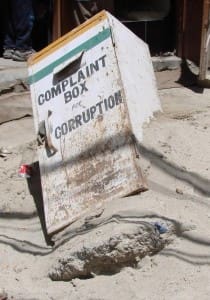
I’ve heard stories about blatant corruption, for example, when employees are paid the salary stated in their contract but are required to bring back half of it in cash every month in order to keep their jobs. Yes, that happens. I’ve also experienced a kind of corruption that is more complex, and in a way, more sinister.
For example, many international donors require that NGO grantees provide, or at least keep, receipts of expenditures paid for with grant funds. Fair enough. The receipts, however, must be official tax receipts, and depending on the amount of the expense, the NGO needs another document proving the vendor has a clean tax record. This is logical when you consider that aid money is needed because tax collections are low and that aid funds should be used in accordance with local law, which includes the payment of sales tax. However, not all vendors are able to provide tax receipts, and not all have proof of a clean tax record.
I know what you’re saying. You’re saying, “Good! Let the money flow to the honest and law-abiding people so the others will be pressured into complying with the law.”
It’s not always that easy.
I was once involved in giving a grant to an NGO in a Palestinian village. A major objective of the grant was to keep the funds inside the village in order to activate the local economy. However, none of the vendors in the village were able to provide tax receipts, so the NGO had to purchase the materials from a big company in Ramallah – just to get the paper required for the donor.
Another time, an NGO grantee found supplies they wanted from vendors who offered tax receipts and vendors who didn’t, but the vendors who offered tax receipts wanted 50% more for the materials. (They ended up buying from the vendor without a tax receipt and purchasing a tax receipt—a forged document—from someone else.
Is all this petty corruption the fault of the Palestinian NGOs? Or do international donors share some fault for requiring NGOs to provide documents that cannot realistically be provided in a legal way?
I know what you’re saying. You’re saying, “Why don’t they just open tax accounts and pay their taxes?”
That’s a good question.
Some people don’t want to pay taxes because they want to keep the money for themselves. That’s true. But even an entity that wants to pay taxes may find it difficult for a number of reasons. When I worked for a Palestinian NGO, it took years and great effort for us to open a tax file because the organization wasn’t registered, and it was the Palestinian Authority itself that was delaying the registration. In other words, “You have to pay, but we won’t let you pay.” Moreover, some organizations can never get legal status for political reasons or because of bureaucratic mess-ups. Still others don’t want to pay taxes to the Palestinian Authority because they don’t consider it legitimate, and because they aren’t accountable for the taxes they do collect. You see? It’s complicated.
But I’m more interested in corruption at a higher level.
Handbooks like Finland’s “Anti Corruption Handbook for Development Practitioners” (and I’ve seen many of them) do acknowledge the responsibility of international actors. For example, p. 43 of Finland’s Handbook states:
INTERNATIONAL/REGIONAL ANTI-CORRUPTION CONVENTIONS OBLIGATE BOTH THE EU MEMBER STATES AND PARTNER COUNTRIES. Support for governance is more than tackling corruption and it cannot be addressed in isolation. Corruption is a major obstacle to achieving development objectives and a symptom of poor governance. International and regional agreements on corruption, must be adhered to, ratified and duly implemented by all development partners.
But when you read further, they imply that the responsibility for addressing corruption is shared, buy that corruption is a problem solely in the receiving country. Corruption in developing contexts, they say, is a failure of governance, but overlook the possibility that there is a failure of governance on the part of international actors involved in development cooperation.
What I’m saying is that international aid and development agencies may themselves be corrupt and may be enforcing corruption on Palestine through their control of funds.
Read this, for example, from p. 21 of Finland’s Handbook:
STATE CAPTURE is recognised as a most destructive and intractable corruption problem. It is a phenomenon in which outside interests (private sector, mafia network etc.) are able to bend state laws, policies and regulation to their benefit through corrupt transactions with public officers and politicians.
Don’t “outside interests” include the political interests of foreign countries?
Are you following my train of thought? What do you think?
Airing Palestinian Dirty Laundry. Wanna Come Help Wash?
“I hope someone kills me before I do another festival ever again. I am at this point hoping and praying to survive….”
This came in an email from a friend who is planning a Palestinian village cultural festival. She’s suffering not just from the amount of work it requires—organizing space, booking cultural performers, recruiting community participation, raising money for it all, publicizing it—but also from the pressure.
On one hand, there is enormous pressure to succeed. A well-implemented cultural festival can bring international and local attention to far-flung villages. It can attract visitors who spend money on local products. It can offer local and international cultural enrichment (singers, dancers, poets). It can draw donors, sponsorships and other kinds of tangible support.
So when volunteers from the community take initiative to put on a cultural festival, it’s a gift of energy and enthusiasm and lots of hard work. It’s a gift to the villagers who experience the direct consequences of occupation (having land and natural resources confiscated by Israel; attacks by army and settlers), and who suffer from high unemployment, infrastructural deficits (water, sewer and electricity), closed markets, isolation, and the range of social and emotional problems that go along with having no hope and feeling like everyone has forgotten you to rot. (No I’m not exaggerating.) It’s a gift to the rest of us who get to visit places we might never have heard of, taste their maftool, stock up on their homemade soap.
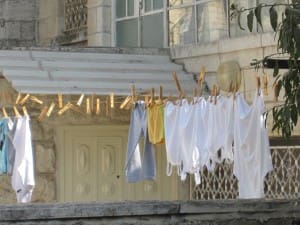 So why, in addition to the pressure to succeed, is there also so much pressure from the community to fail?
So why, in addition to the pressure to succeed, is there also so much pressure from the community to fail?
I’ve heard about situations where the villagers themselves try to sabotage the cultural festival: They take on tasks and don’t do them. They criticize every decision, even if it was made collectively. They try to slander the leaders of the event. They even come to the event and make a mess and refuse to help clean up. Why??
I’ve had the same experience myself in some Palestinian community projects. In one situation, people working on the project began to fight among themselves. They brought others on to their side against the project. They badmouthed the project and sometimes lied – even while they were still active beneficiaries. They ultimately managed to close the project so no one could benefit.
Why??? It isn’t logical! (I know this isn’t pleasant, but we have to talk about our problems in order to solve them.)
Some people say it’s internalized oppression, depression, greed, jealousy, competition, poor breeding. I really don’t know.
I do know that we have a lot of excellent, hardworking community-minded volunteers and we should be supporting them and affirming them, not wearing them down and burning them out.
That’s what I intend to do – get more involved in local events, help spread the word, help them realize their potential for success. To start with, I will be at the Taybeh Oktoberfest this October 6 and 7 from 11 am to 10 pm (directions on taybehbeer.com and taybehmunicipality.org). You don’t need to drink beer if you don’t want to. Just come and enjoy the cultural presentations, buy the local products, and enjoy the historic village.
Also, there is a list of annual cultural festivals and other events of interest at http://visitpalestine.ps/en/discover-palestine/festivals-and-cultural-events. There are monthly updates about local events at www.ThisWeekInPalestine.com. And, there are visits to farms and community gardens organized by Sharaka – Community Supported Agriculture and others. There is so much that is good going on!
Will you help support Palestinian cultural festivals by attending? Will you join your voice with mine to thank and recognize Palestinian volunteers who give of their time and effort to bring joy and benefit to villages despite very difficult circumstances? Will you help counter the tendency towards negativity by working constructively to make things better in Palestine?
To whet your appetite, here’s a draft schedule of events:
Saturday October 6th
11:00 am – Opening Celebration with ecumenical prayer and national anthem; welcome by Honorable David C. Khoury, Mayor of Taybeh; Musikkapelle Leobendorf (band from Bavaria); Greek Orthodox School Folklore Show; The SUN (band from Italy); Taybeh Folklore Dance Group; Trio Dona Zefa (band from Brazil)
1:15 pm – Musikkapelle Leobendorf (band from Bavaria)
2:00 pm – Taybeh Walk (starts at Taybeh Brewery)
2:15 pm – Sri Lanka Traditional Dance and Classical Drums
2:15 The French-German mobile library for children together with Tamer-Institute present story telling (30 min) with Salwa, face painting and other activities for children at the Mobile Library in the bus (open until 5 pm)
2:30 pm – Trio Dona Zefa (band from Brazil)
2:30 pm – Visit the Nasr Priestly Home founded in 1568 built on caves and cisterns (open until 6 pm)
3:00 pm – Yalla Yalla Parade in front of municipality road
3 pm – Have fun watching Ramallah Street Hockey in the Latin School Yard (until 7 pm)
3pm – Experience German in 20 minutes or less! Fun taster lessons in German with Anja! At entrance to Municipality Grounds, preschool building left side (also at 4pm and 5pm)
3:30 pm – “Yalla Farah” Al Harah Theater (Beit Jala)
4pm – “From West to East: A Taybeh Art Exhibition” View works of two diverse and distinct artists sharing the same common thread of being Palestinian. At: Greek Catholic Church Hall (to 8 pm)
4:30 pm – Taybeh Beer Competition with Madees Khoury, Palestinian female brewer
5:00 pm – The SUN (band from Italy)
6:00 pm – DAM – Palestinian Hip Hop
7:00 pm – Al Raseef (Ramallah)
8:00 pm – Taybeh Folklore Dance Group
8:30 pm – Ramallah Orthodox Club
Ongoing – Take a nice walk in the old city to enjoy the amazing Palestinian architecture preserved by RIWAQ and stop by Peter’s Place, home of Holylanders Society for the Preservation of Christian Heritage; View the Taybeh Heritage Exhibition and other hand crafted design jewelry.
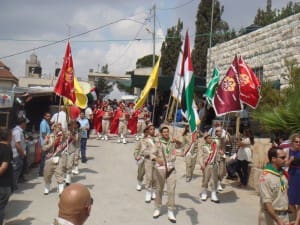
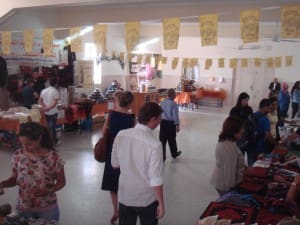
Sunday October 7th
11 am – Meet the artists Nabeel Hanna Muaddi and Issa Zawahreh “From West to East: A Taybeh Art Exhibition” View works of two diverse and distinct artists sharing the same common thread of being Palestinian. At: Greek Catholic Church Hall (to 8 pm)
11:30 am – Palestinian Circus School
12:15 pm – Hakaya Children’s Program with Fidaa Ataya
1:00 pm – Musikkapelle Leobendorf (band from Bavaria)
2:15 The French-German mobile library for children together with Tamer-Institute present story telling (30 min) with Salwa, face painting and other activities for children at the Mobile Library in the bus (open until 5 pm)
3:00 pm – German fun taster lessons (until 5 pm)
2:00 pm – Taybeh Walk (starts at Taybeh Brewery)
2:00 pm – Taybeh Beer Competition with Madees Khoury, Palestinian female brewer
2:30 pm – Visit the Nasr Priestly Home founded in 1568 built on caves and cisterns (open until 6 pm)
3:00 pm – Yallah Yallah Parade in front of municipality road
3:00 pm – The SUN (band from Italy)
3pm – Experience German in 20 minutes or less! Fun taster lessons in German with Anja! At entrance to Municipality Grounds, preschool building left side (also at 4pm and 5pm)
4:00 pm – Palestinian Circus School
4:30 pm – X Games (Qalqilia)
5:00 pm – Toot Ard (Golan Heights)
6:00 pm – Al-Rowwad Culture and Theater Society
7:00 pm – Qalandia Blues (Jerusalem)
8:00 pm – Taybeh Folklore Dance Group
8:30 pm – Luminaries (USA) and X Games (Qalqilia)
See you there?
NGO Hush Money: Trading Silence for Access and Privilege (reblogged)
This article [originally posted at http://www.thinkir.co.uk/ngo-hush-money/ and reblogged with permission of the author] considers the possibility that international NGOs may not be fulfilling their mandate to Palestinians by keeping silent on key issues in exchange for access to the occupied Palestinian territories and preferential treatment by Israeli authorities, mirroring a system of control used by Israel to manipulate Palestinian Authority officials.
 from the Deccan Chronicle
from the Deccan ChronicleIn her article “VIP Hush Money,” journalist Amira Hass describes the manner in which Israel uses special permits for travel as a way to manipulate and maintain control over the leadership of the Palestinian Authority (PA). She details how the Israeli government has stripped a few dozen senior PA officials, including President Mahmoud Abbas, of their VIP permits since mid-2011 as a form of punishment for the PA’s application to the United Nations for admission as a member state. This VIP status gives its Palestinian bearer free movement throughout Israel and the occupied Palestinian territories (oPt), a basic right that is simultaneously denied to millions of other Palestinians who are barricaded into tiny little cantons under PA control throughout the West Bank and Gaza strip.
Hass reveals how command over this very basic aspect of life, movement, is used by Israel to control its subject Palestinian population in the West Bank and Gaza Strip. With Hass referring to this as a form of colonialism, Noam Chomsky regards it as part of a neo-colonial model of control where Israel also permits and encourages a privileged existence for Palestinian elites in Ramallah, largely sustained by European funding. When it chooses not to permit those PA officials to move about freely, Israel is asserting its control over them and manipulating peace negotiations in its favour.
Hass points out that “collaborating with the humiliation inherent in VIP status conferred by the occupier is part of the PA’s whole concept. Its senior officials lavish praise in their speeches on ‘popular resistance’ as the preferred alternative to taking up arms. But in the very sphere where they could easily engage in civil disobedience of their own, they don’t do it.” However, it is not just the PA that is taking part in this system of humiliation and collaboration. There are hundreds of “well-meaning” Non-Governmental Organisations (NGO) that are provided with VIP status of their own, allowing them freedom of movement into the oPt, in return for providing basic services and funding for Palestinians that Israel is not willing to provide itself.
In the same way that Israel maintains control over freedom of movement in order to rein in uncooperative Palestinian leaders, it also uses control of movement over hundreds of foreign NGOs and thousands of foreign NGO workers (and rights activists) who operate out of the West Bank, Gaza and Israel. If any of them are to stray too far in their activities into advocacy work that is deemed threatening to Israeli policy, the government of Israel will simply refuse them access at the border with Israel and the oPt.
This is a serious threat that occupies the minds of every NGO worker (and human rights activist) that has to travel through the Israeli border in order to get to the West Bank or Gaza Strip. It preoccupies their preparations before each journey through Ben Gurion Airport and the Allenby Bridge crossing, needing to prepare different plans should they not gain access. By not being able to enter through the Israeli border in order to carry-out funded aid projects, NGOs run the risk of losing their funding and workers of losing their jobs. Add to that the reality that thousands of people do get turned away and sent home at the border every year[1].
 from BBC News
from BBC NewsThis fear leads to organisations censoring their advocacy work and blunting their criticism of the source of Palestinians’ problems, “the Occupation.” Outspoken criticism of the occupation is the activity Israel most opposes. So long as they choose not to be too outspoken and disobedient, Israel also allows foreign NGO workers to enjoy a comfortable and privileged existence in Ramallah, largely funded by Europe, where they enjoy a state of relative calm from the violence associated with night raids or invasions, the comforts of modern life, and a booming cafe and night club culture. Israel even facilitates freedom of movement for foreign nationals at the Qalandia checkpoint between Ramallah and Jerusalem by not forcing them to leave public buses to go through the intimidating security checkpoint where their bags are screened and passports checked before gaining entry. Considering deepening economic malaise and joblessness back home, many foreign NGO workers from Europe or North America may be even less inclined at this time to lose their job in the oPt. As one young American aid work told this author in 2010, “It is actually better to be here, where there are jobs, than back in America, where there are none.”
With the benefits of VIP status, working at an NGO in the oPt can be an exciting and comfortable career opportunity, even while the Palestinians they are supporting continue to suffer under occupation and to slip further into poverty. If those foreign NGO workers should stray too far from behaviour deemed acceptable by the government of Israel, it is not afraid to rein those NGOs in. Indeed, Israel regularly reminds foreign NGOs that their ongoing presence in territory it occupies depends precariously on its permission. For example, in 2010 Israel largely eliminated work visas for the employees of those NGOs privileged enough to be able to apply for work visas, forcing foreign employees to take tourist visas that are valid only for up to three months[2]. Employees on a tourist visa are forced to exit and re-enter through the Israeli border, where they may be refused entry. There are even fears that “international staff may be accused of working illegally and consequently face punitive measures, including long-term barring of entry into or passage through Israel due to violation of Israeli employment laws.”
This is a significant contributing factor to NGOs engaging in self-censorship of their own work. Hart and Lo Forte note in their research on child protection in the oPt that NGOs clearly operate on a matter of pragmatism over principle, with “Western donor governments generally choosing not to challenge Israel on practices that clearly put the lives of Palestinian children at risk, preferring to support ad hoc efforts to improve conditions or equip families to cope with the intolerable.” The result is that child protection becomes focused on response to harm rather than prevention[3]. Hart and Lo Forte note that some donors, such as the United States government, will even use control of funding to limit any public advocacy that might embarrass Israel. Just as the United States government can deny funding for aid projects that advocate too heavily on behalf of Palestinian children, Israel can simply deny NGOs access to operate on occupied Palestinian territory, putting an end to their work. In this way, Israel’s control over the movement of NGOs allows it to maintain control over the work of those NGOs themselves.
By not addressing the root causes of the problem and only inadequately addressing the results, NGOs may simply be helping to offset the costs of war and occupation bourn by the Israeli government in the oPt, a warning given nearly 150 years ago when Florence Nightingale criticised Henri Dunant’s plan to create a civilian medical service (the future International Committee of the Red Cross) as something which would actually relieve governments of part of the burden of going to war, allowing them to more easily engage further in it. As Mary Anderson points out in Do No Harm, aid provides the dual possibility of either supporting peace or supporting war, depending on how it is applied. Regardless of the difficulties inherent in working in an occupied territory, the NGO community should take serious time to reflect upon whether or not just “being there” balances out with any detrimental effects that may be caused by not addressing the primary problem, the occupation, and the possibility they are relieving the occupier, Israel, from some of the costs of occupation. Considering the retrogressive nature of a long-stalled peace process and an ongoing decline in Palestinian standards of living, those NGOs may find that it is time to take a new approach to their work, emphasizing advocacy and demanding open access without hindrance, or else simply refusing to provide assistance if it is only serving to subsidize the activities of the occupier.
Additional Note:
Attaining the requisite documentation for access to the oPt by NGOs is both complex and expensive. A June 2011 Association of International Development Agencies (AIDA) report notes that “the complexities of obtaining the requisite documentation to freely move national and international staff between Jerusalem, the West Bank and Gaza severely hampers the ability of AIDA members to deliver projects, effectively manage and monitor projects, hire appropriate personnel, share best practices, train staff or coordinate with other organizations.” The report estimated that the restrictions cost those organisations an additional $4.5 million per year.
[1] There are thousands of examples of people being refused entry at the border to Israel: tourists, spouses or family members of Palestinians, academics, activists, journalists and NGO workers. Recent high profile examples include Irish Nobel Peace Prize Laureate Mairead Maguire and American Professor Noam Chomsky. The number of people refused entry into Israel was 1 828 in 2005 and 2 941 in 2007.
[2] The length of stay or area of geographical access given in a Visa provided at the Israeli border at the Allenby Bridge crossing with Jordan can be highly arbitrary: ranging from as little as one day to three months in length, and from access to Palestinian Authority areas only to all of the oPt and Israel.
[3] Hart and Lo Forte found that organisations such as Save the Children US and UNICEF are placed in a challenging position where they must balance accountability to the population they are there to serve with the demands of donors and the anxieties of their superiors at headquarters. Too often, it seems, downwards accountability is severely compromised, if not abandoned.
About JeremyWildeman
Jeremy Wildeman (B.A. Saskatchewan, M.A. McMaster) is a PhD candidate at the University of Exeter, where he is conducting research into the effects of foreign aid on Palestinians. Previously he co-founded and managed the internationally registered, West Bank-based charity for Palestinian youth “Project Hope” (www.projecthope.ps). He is a founding committee member for the International Relations Blog “ThinkIR” (www.thinkir.co.uk). In his spare time he maintains a Blog about using digital tools in post-secondary research called “iScholarapp” (www.ischolarapp.com).
- « Previous Page
- 1
- …
- 3
- 4
- 5
- 6
- Next Page »
